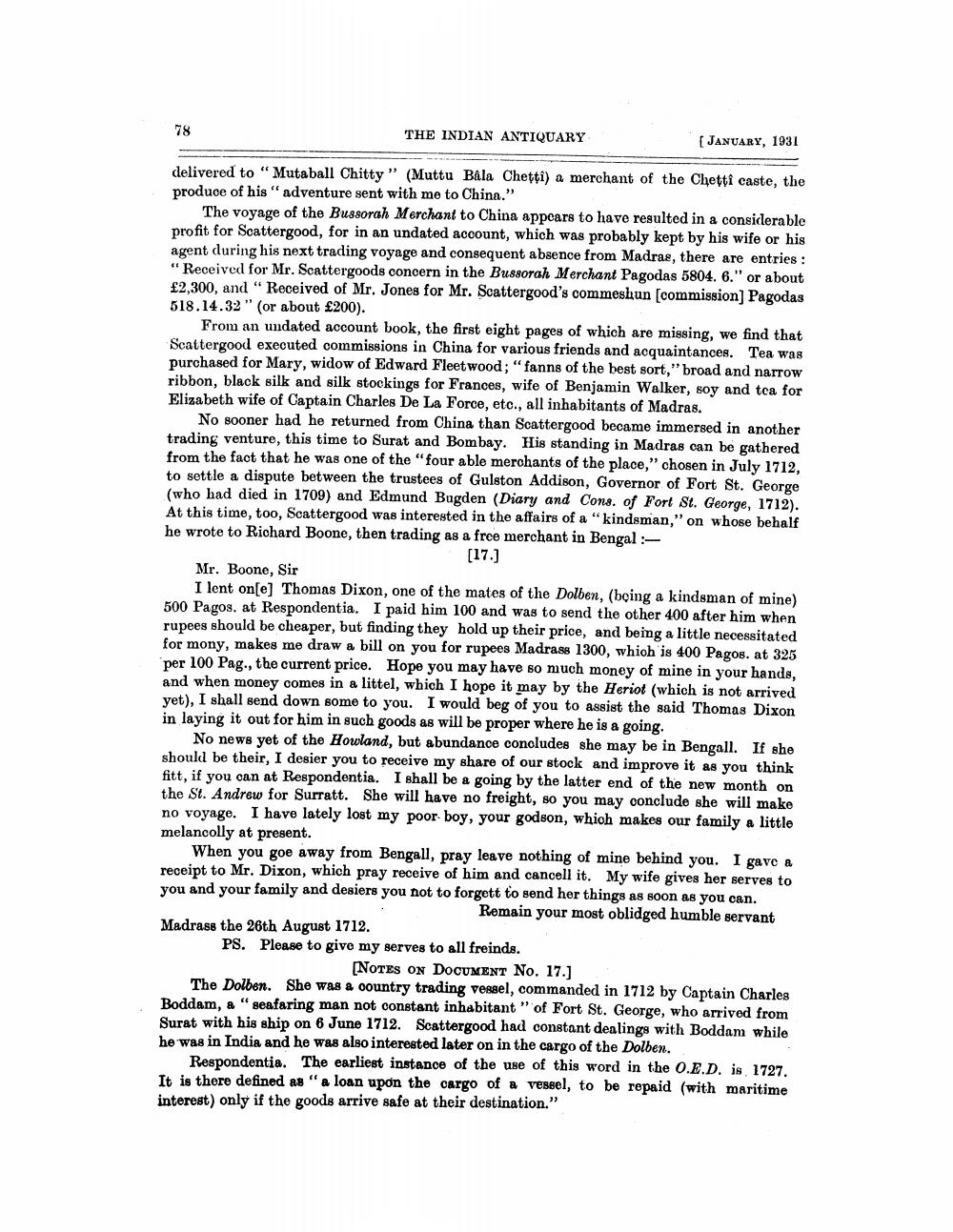________________
78
THE INDIAN ANTIQUARY
[ JANUARY, 1931
delivered to "Mutaball Chitty" (Muttu Bala Chetti) a merchant of the Chetti caste, the produce of his "adventure sent with me to China."
The voyage of the Bussorah Merchant to China appears to have resulted in a considerable profit for Scattergood, for in an undated account, which was probably kept by his wife or his agent during his next trading voyage and consequent absence from Madras, there are entries : "Received for Mr. Scattergoods concern in the Bussorah Merchant Pagodas 5804. 6." or about £2,300, and "Received of Mr. Jones for Mr. Scattergood's commeshun [commission) Pagodas 518.14.32" (or about £200).
From an undated account book, the first eight pages of which are missing, we find that Scattergood executed commissions in China for various friends and acquaintances. Tea was purchased for Mary, widow of Edward Fleetwood;"fanns of the best sort," broad and narrow ribbon, black silk and silk stockings for Frances, wife of Benjamin Walker, soy and tea for Elizabeth wife of Captain Charles De La Force, etc., all inhabitants of Madras.
No sooner had he returned from China than Scattergood became immersed in another trading venture, this time to Surat and Bombay. His standing in Madras can be gathered from the fact that he was one of the "four able merchants of the place," chosen in July 1712, to settle a dispute between the trustees of Gulston Addison, Governor of Fort St. George (who had died in 1709) and Edmund Bugden (Diary and Cons. of Fort St. George, 1712). At this time, too, Scattergood was interested in the affairs of a "kindsman," on whose behalf he wrote to Richard Boone, then trading as a free merchant in Bengal :
(17.) Mr. Boone, Sir
I lent one] Thomas Dixon, one of the mates of the Dolben, (being a kindsman of mine) 500 Pagos. at Respondentia. I paid him 100 and was to send the other 400 after him when rupees should be cheaper, but finding they hold up their price, and being a little necessitated for mony, makes me draw a bill on you for rupees Madrass 1300, which is 400 Pagos. at 325 per 100 Pag., the current price. Hope you may have so much money of mine in your hands, and when money comes in a littel, which I hope it may by the Heriot (which is not arrived yet), I shall send down some to you. I would beg of you to assist the said Thomas Dixon in laying it out for him in such goods as will be proper where he is a going.
No news yet of the Howland, but abundance concludes she may be in Bengall. If she should be their, I desier you to receive my share of our stock and improve it as you think fitt, if you can at Respondentia. I shall be a going by the latter end of the new month on the St. Andrew for Surratt. She will have no freight, so you may conclude she will make no voyage. I have lately lost my poor boy, your godson, which makes our family a little melancolly at present.
When you goe away from Bengall, pray leave nothing of mine behind you. I gave a receipt to Mr. Dixon, which pray receive of him and cancell it. My wife gives her serves to you and your family and desiers you not to forgett to send her things as soon as you can.
Remain your most oblidged humble servant Madrass the 26th August 1712. PS. Please to give my serves to all freinds.
NOTES ON DOCUMENT No. 17.1 The Dolben. She was a country trading vessel, commanded in 1712 by Captain Charles Boddam. a " seafaring man not constant inhabitant" of Fort St. George, who arrived from Surat with his ship on 6 June 1712. Scattergood had constant dealings with Boddam while he was in India and he was also interested later on in the cargo of the Dolben.
Respondentia. The earliest instance of the use of this word in the O.E.D. is 1727. It is there defined as "a loan upon the cargo of a vessel, to be repaid (with maritime interest) only if the goods arrive safe at their destination."




